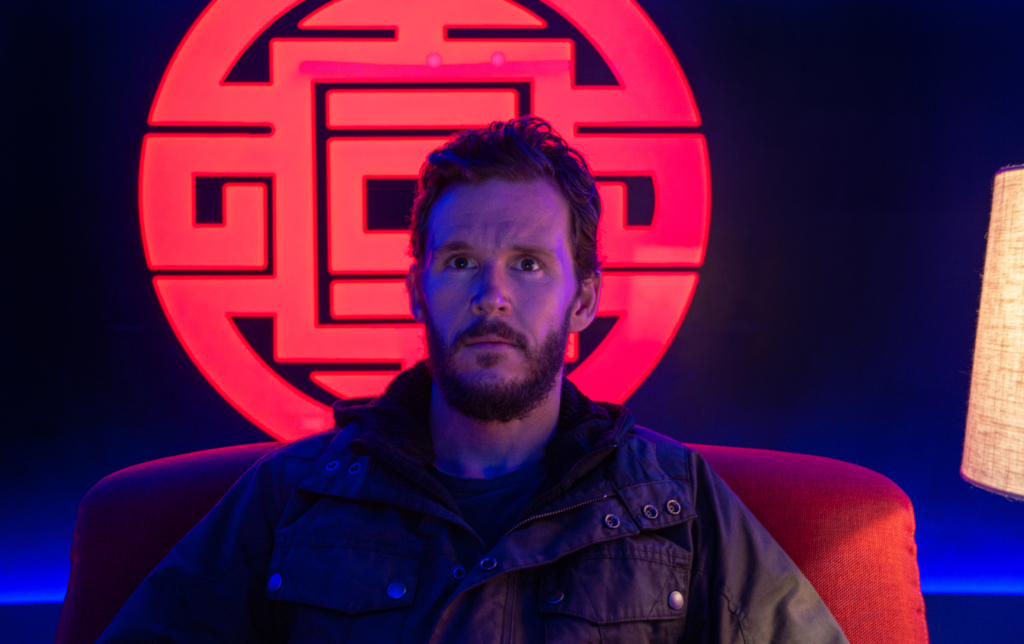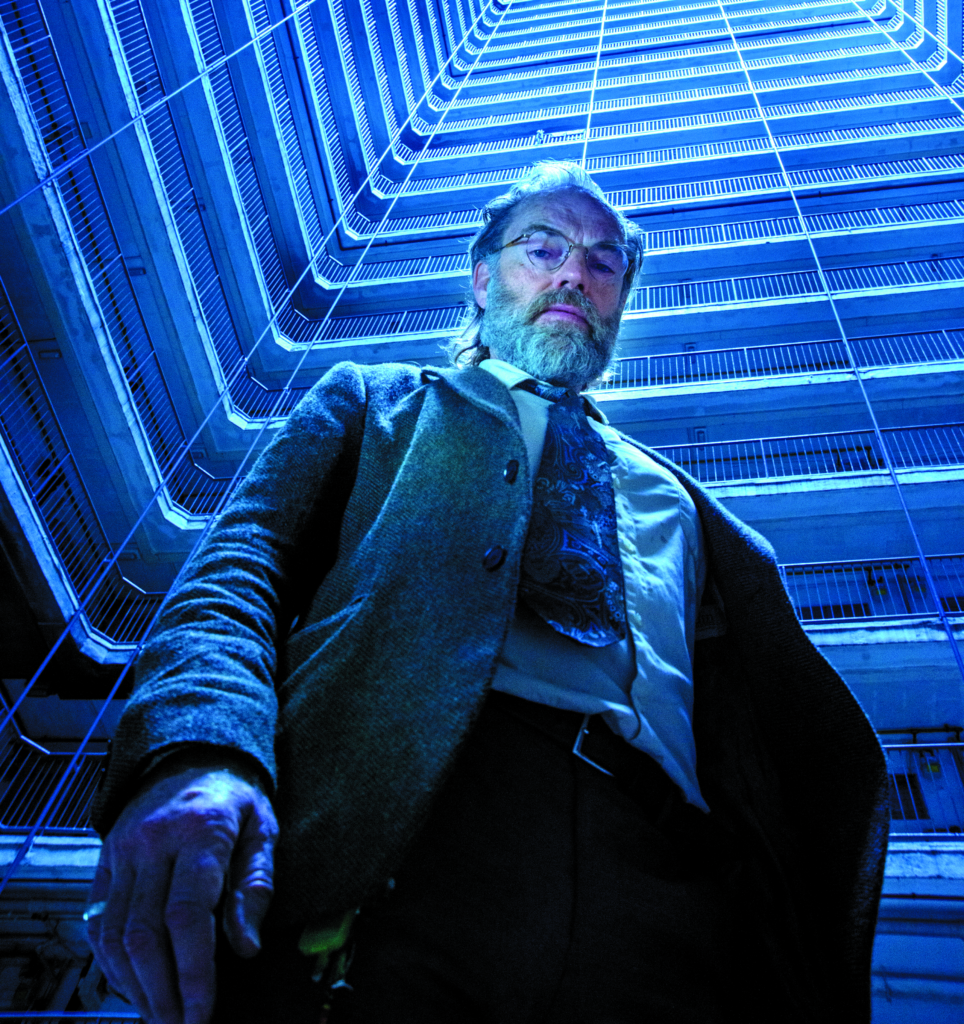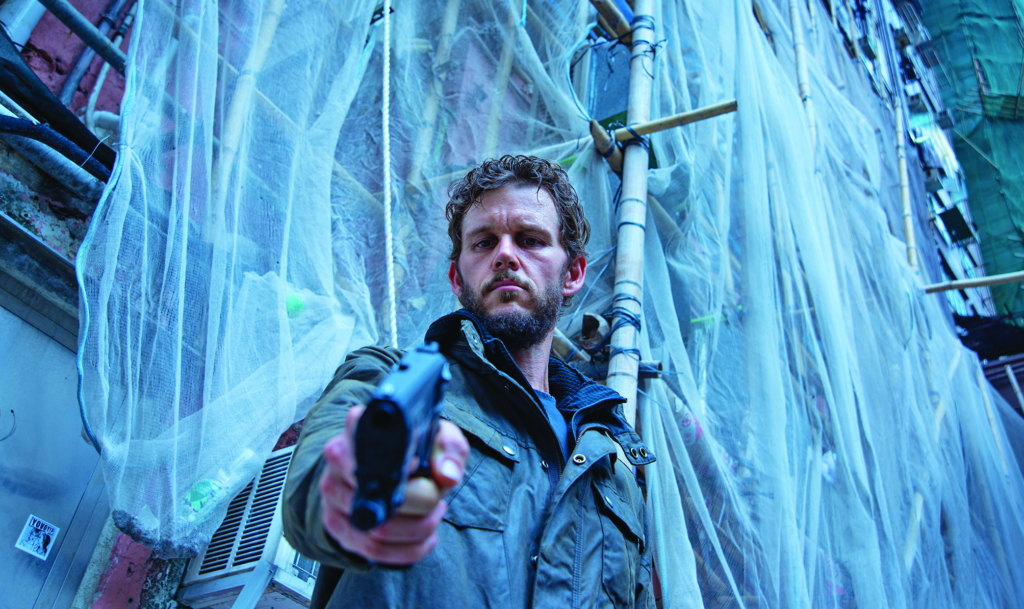While the twenty-first century has seen a massive uptick in Indigenous Australian representation both on screen and behind the camera,[1]See ‘Indigenous Production’, Screen Australia website, <https://www.screenaustralia.gov.au/fact-finders/production-trends/indigenous-production>, accessed 1 June 2022. it is still relatively rare for First Nations filmmakers to tackle material that is not explicitly addressing Indigenous experiences. Answers as to why this might be the case are complicated, and generalisations – is this absence due to personal artistic choice, for instance, or systemic barriers? – are a blunt tool. Still, whatever the cause, the trend is readily apparent: only Wayne Blair’s coolly received 2015 drama Septembers of Shiraz, a US production set in post-revolutionary Iran and starring Adrien Brody and Salma Hayek, comes to mind as a recent example of an Indigenous Australian director working with non-Indigenous subject matter in a fiction feature. But now we have Gamilaraay director Ivan Sen’s long-in-gestation Loveland[2]The film has been released in some foreign territories (including the United States) under the title Expired. (2022) to consider as well.
Sen first gained wide acclaim with his debut feature, Beneath Clouds (2002), whose narrative reflected his own experiences as the child of an Indigenous mother and a European father. However, his second feature, the experimental and little-seen Dreamland (2009), saw him start to play with science fiction themes through its story of a UFO hunter (Daniel Roberts) roaming the Nevada desert in search of flying saucers. Sen has noted that the film was an attempt to make a project not predicated on ‘all this identity stuff’, but he was unhappy with the result,[3]Ivan Sen, quoted in Garry Maddox, ‘Mystery Road and Goldstone Director Ivan Sen’s Most Ambitious Project Yet’, The Sydney Morning Herald, 10 March 2022, <https://www.smh.com.au/culture/movies/why-stop-at-director-ivan-sen-proves-himself-a-master-of-all-trades-20211215-p59hpz.html>, accessed 31 May 2022. and Dreamland is now out of circulation.[4]See Peter Robb, ‘Dreamland’, The Monthly, November 2011,<https://www.themonthly.com.au/issue/2011/november/1326604262/peter-robb/journey-through-north-western-nsw-filmmaker-ivan-sen#mtr>, accessed 1 June 2022. Toomelah (2011) and the Mystery Road film (2013) and TV series followed, but now we see Sen revisiting both the science fiction genre and the themes of alienation, loneliness and the importance of empathy that have characterised his work thus far.

Set in a near-future Hong Kong, and partly shot there in guerrilla style during the city’s recent pro-democracy protests,[5]For more on this, see Anthony Carew, ‘Uneasy Transition: The City Documented in Hong Kong Moments and Many Undulating Things’, Metro, no. 207, 2021, pp. 74–81. Loveland follows low-rent hitman-for-hire Jack (played by a suitably haggard and haunted-looking Ryan Kwanten) as he plies his trade in the city’s neon-hued slums. Jack is an island – he has no friends, no family, no lovers. In voiceover narration, he speaks of being abandoned by his mother as a baby and wondering if she would recognise him now. His habit of renting time with robot sex workers that resemble middle-aged women speaks to the root of his alienation.
Jack’s world is upended when he encounters April (Jillian Nguyen), a Vietnamese immigrant who works in a kind of peepshow–cum–karaoke bar where men can pay to be serenaded by women in private booths. A tentative courtship unfolds as the solitary Jack attempts to forge a connection with April, but problems arise when he begins to experience painful symptoms after interacting with her. He seeks help from a reclusive scientist, Dr Bergman (Hugo Weaving), formerly a specialist in life extension who is now living anonymously and working as a supermarket shelf-stacker. While Bergman seeks to uncover the reasons for Jack’s illness and Jack plans a life with April, assassins are closing in to take revenge for one of the hitman’s earlier killings.
Loveland sits firmly in the cyberpunk subgenre of science fiction that first came to prominence in the early 1980s, with works like William Gibson’s 1984 novel Neuromancer and Ridley Scott’s film Blade Runner (1982) at the vanguard. Cyberpunk narratives are generally dystopian tales set in oppressive urban environments, positing a world where out-of-control capitalism has led to the withering of personal freedoms and the destruction of the natural world. Noir tropes are common in these texts, and cyberpunk characters are not a million miles away from the detectives, criminals, grifters and gun-molls that populated the American crime cinema of the 1940s and 1950s.

Yet Loveland deploys cyberpunk tropes in subversive and interesting ways. Sen’s film has drawn comparison with Blade Runner in terms of its visual style, but it’s worth acknowledging that Scott’s film posits (and, on sound stages, built) a then-future Los Angeles demographically dominated by Asian characters and culture – which, whatever the intent, smacks of both Orientalism and ‘yellow peril’ parochialism. Sen flips the script by taking us to a Chinese city and setting his characters adrift there, getting a similar sense of alienation without the unfortunate ‘Asian invasion’ connotations.
Sen – who, as well as writing and directing the film, acted as its cinematographer – deliberately de-emphasises the setting. This is particularly the case in exterior shots and street scenes, where he frequently employs shallow focus in order to set his characters against a busy but blurry backdrop of noise, neon and bustle. The occasional wide cityscape is augmented with computer-generated imagery depicting a drone or robot here, a piece of consumer technology there, to remind us that what we’re watching is not precisely contemporaneous with our own time, but an abstracted near future. It’s more grounded and effective than more overt attempts to postulate tomorrow, recalling both fellow Australian sci-fi movie Mad Max’s (George Miller, 1979) depiction of a decaying society set ‘a few years from now’ and Gibson’s oft-quoted (but frustratingly difficult to pin down) dictum that ‘the future has arrived – it’s just not evenly distributed yet’.[6]See ‘The Future Has Arrived – It’s Just Not Evenly Distributed Yet’, Quote Investigator, 24 January 2012, <https://quoteinvestigator.com/2012/01/24/future-has-arrived/>, accessed 1 June 2022. Tomorrow arrives in dribs and drabs, while resources – technological and otherwise – are hoarded by the privileged, only gradually filtering down to the less fortunate. Sen’s allusions to this in Loveland recall another famous Gibson quote: ‘The street finds its own uses for things.’[7]William Gibson, Burning Chrome, Ace Books, New York, 1987, p. 186.
As we learn as the film progresses, the street has found its own uses for Jack. Bergman reveals that Jack was sold to a corporation as a baby and used in a life-extension experiment, his emotional responses being artificially deadened via hormone restriction as a way to increase his life span. It’s clear, albeit unspoken, that Jack’s muted emotional state is what has allowed him to function as a hired killer. Bergman, who admits he himself was in charge of the experimental program, hypothesises that as Jack is developing feelings, the reintroduction of long-absent hormones into his system is causing his sickness. Love is killing him.

The film asks us to compare Jack’s situation with that of a type of butterfly we are told lives a long time but spends most of that existence as a chrysalis in torpor. Butterflies are a repeated visual motif: April sports a tattoo of one on her wrist, while even Sen’s repeated shallow focus suggests his characters are trapped between planes like insects under glass. Loveland’s central question, thus, is whether longevity or emotional connection is more valuable, a concept that once more sees the film harking back to Blade Runner, complete with its empathy-measuring machines and artificial life forms with truncated life spans.
Butterflies are a repeated visual motif: April sports a tattoo of one on her wrist, while even Sen’s repeated shallow focus suggests his characters are trapped between planes like insects under glass.
But we’ve seen throughout Loveland that connection is extremely valuable – and not just to characters like Jack, whose longing is plain, and Bergman, who himself alludes to the painful loss of someone close to him (although the specifics are never pinned down). April’s job speaks to a world where intimacy, or the illusion thereof, has been commodified. And intimacy in this context refers to more than just sex: April, after all, is not a sex worker, but rather earns a living by forging a connection with the clients who come to her booth. For his part, Jack is all but asexual; when we see him with a robot sex worker early in the film, he’s simply lying in bed next to her like a child, and he later does the same with April. As this longing is clearly shown to predate his first encounter with April, we are encouraged to question whether Bergman’s diagnosis is even valid. Nonetheless, it is with April that Jack finally imagines and strives for some kind of different life.

Yet he never considers what she might want. And we are not encouraged to, either. Sen plays interesting games with the notion of interiority, giving us access to the inner lives of both Jack and Bergman through voiceover narration, but limiting our access to April. We see her primarily through the lens of Jack’s experience of her; to him, she is a symbol and a fantasy – the lover/Other/mother he never had. It’s easy for us to empathise with Jack’s desire for her, but just as easy to miss that her responses to him and her actions might be more calculated than Jack suspects. We are not encouraged to try to parse what might be performance, but rather to take what she says at face value. It’s an act of cinematic seduction, and both Jack and the audience are the target – from April’s first performance for him, in which she sings a song with the refrain ‘Every beat of my heart is just for you’, to the film’s oblique, devastating climax.
After the assassins on Jack’s trail – who have throughout the film mostly been a quiet menace in the background of the main narrative action – finally strike, a cutaway to April shows her dumping his pistol in a public bin; she has set him up for death, and we see that her price was being reunited with the young daughter whom she previously told Jack she had been parted from. It’s a brilliant reversal, calling into question our entire perception of the dynamic between April and Jack up until that point. Our focus has been so tightly centred on Jack’s needs and wants that the sudden reveal that another character’s might be at odds with his is genuinely shocking.
And genuinely smart. April’s somewhat stilted dialogue throughout the film could be language difficulty, or it could be a result of rote rehearsal – the sort of things she might say to a customer to encourage a longer booking. Their tentative relationship is reframed as someone carefully calibrating their proximity to a mark for best advantage. April is not revealed to be a villain, but simply a person with her own agenda: not to save an emotionally compromised hitman, but to reconnect with someone she already loves. It’s interesting to note that, of the three lead characters, only April is Asian, like the bulk of the background players – we must wonder if part of Jack’s fantasy is to ‘save’ her from her life and world.

Cyberpunk media often deals with the commodification of life, offering us stories of cyborgs and androids who buck against the roles their creators have designated them for – consider Paul Verhoeven’s RoboCop (1987) as a prime example. What’s striking about Sen’s take on the genre is that he feels no need to indulge in that level of abstraction, rather demonstrating the way the dominant culture pigeonholes people who are seen as ‘Other’: in this case, a Vietnamese woman. Here, Jack is the protagonist of his own story, but he makes the error of assuming he’s also the hero of April’s – and it’s this illustration of the white tendency to lionise one’s own role in relation to people of colour that makes Loveland not an anomaly in Sen’s body of work, but an integral part.
Endnotes
| 1 | See ‘Indigenous Production’, Screen Australia website, <https://www.screenaustralia.gov.au/fact-finders/production-trends/indigenous-production>, accessed 1 June 2022. |
|---|---|
| 2 | The film has been released in some foreign territories (including the United States) under the title Expired. |
| 3 | Ivan Sen, quoted in Garry Maddox, ‘Mystery Road and Goldstone Director Ivan Sen’s Most Ambitious Project Yet’, The Sydney Morning Herald, 10 March 2022, <https://www.smh.com.au/culture/movies/why-stop-at-director-ivan-sen-proves-himself-a-master-of-all-trades-20211215-p59hpz.html>, accessed 31 May 2022. |
| 4 | See Peter Robb, ‘Dreamland’, The Monthly, November 2011,<https://www.themonthly.com.au/issue/2011/november/1326604262/peter-robb/journey-through-north-western-nsw-filmmaker-ivan-sen#mtr>, accessed 1 June 2022. |
| 5 | For more on this, see Anthony Carew, ‘Uneasy Transition: The City Documented in Hong Kong Moments and Many Undulating Things’, Metro, no. 207, 2021, pp. 74–81. |
| 6 | See ‘The Future Has Arrived – It’s Just Not Evenly Distributed Yet’, Quote Investigator, 24 January 2012, <https://quoteinvestigator.com/2012/01/24/future-has-arrived/>, accessed 1 June 2022. |
| 7 | William Gibson, Burning Chrome, Ace Books, New York, 1987, p. 186. |





